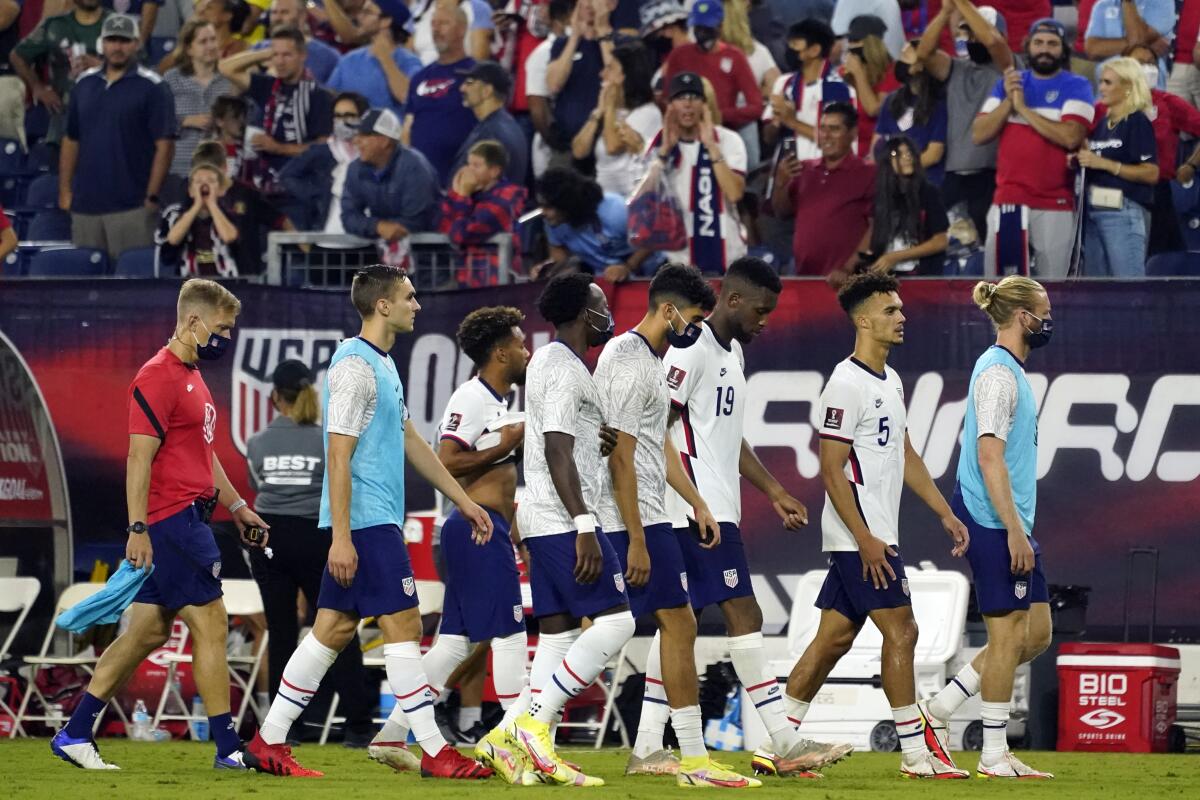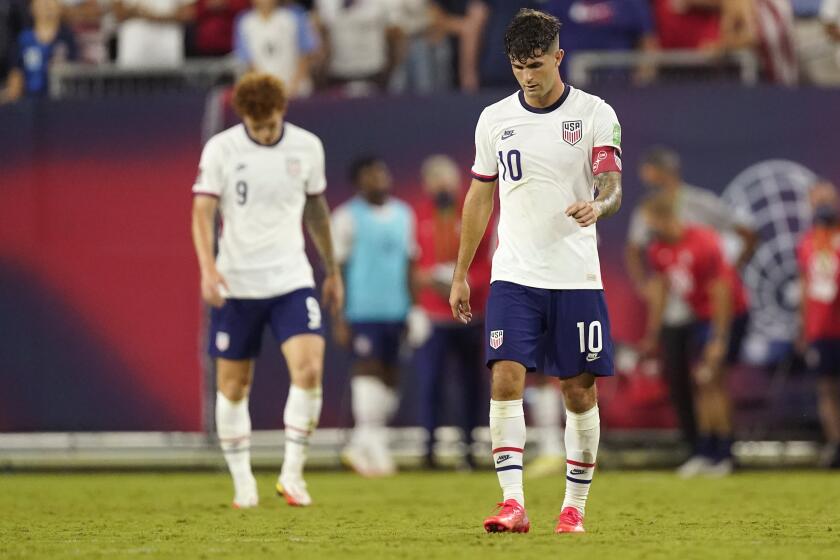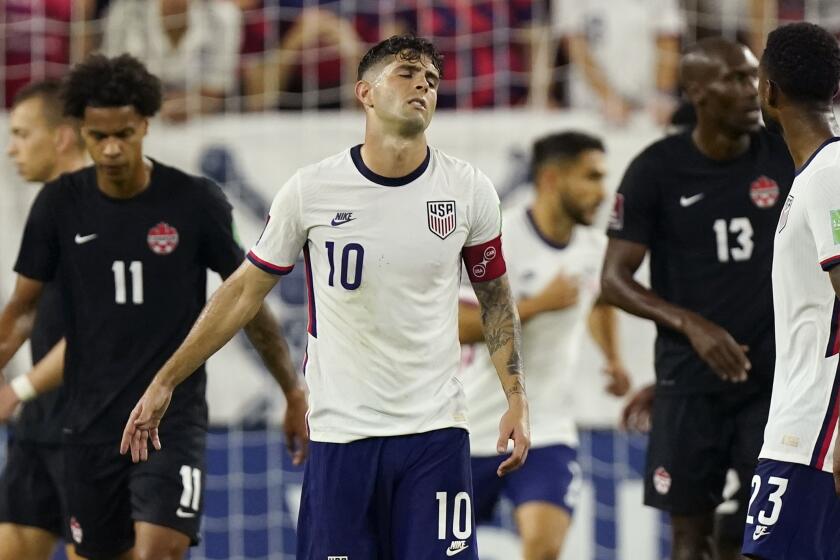U.S. soccer braces for hostility, gamesmanship during World Cup qualifier in Honduras

- Share via
SAN PEDRO SULA, Honduras — Shin-high grass. A rain of batteries, bags of urine and severed animal heads. Lost luggage, loud parties, hotels with no electricity and weather that is either way too hot, way too humid or way too much of both.
Those are just some of the distractions the U.S. national soccer team has had to deal with when playing World Cup qualifiers on the road. And that’s where it will be Wednesday when the team — missing four starters to injury or suspension — faces Honduras in the unfriendly confines of Estadio Olímpico Metropolitano, on a field surrounded by a chain-link fence for the players’ protection.
“It’s like Thunderdome,” said Alexi Lalas, a former national team defender who played in 12 qualifiers. “You just want to get out alive to a certain extent.”
That can often feel like an unlikely outcome. At halftime of a qualifier played before a hostile crowd of 115,000 in the heat, altitude and smog of Mexico City, Lalas feared for Cobi Jones’ life as he watched his teammate cough up “disgusting globules of dark stuff.”
“Those things, combined [with] the machine guns and the dogs and the fire alarms that will get pulled, all of that kind of stuff happens,” Lalas said. “So you’ve got to be mentally strong to bob and weave and just roll with all the s--- that’s about to come. Literally.”
Yes, there are also stories of excrement being thrown at players, another reason playing in CONCACAF, the FIFA confederation that encompasses North America, Central America and the Caribbean, is not for the faint of heart or weak of constitution. And it’s already proven a learning experience for a young U.S. team that entered the current tournament with 19 players who had never taken part in a CONCACAF qualifier.
“There’s no simulation for playing on a horrible field, 95-degree weather with 90% humidity, other than doing it and realizing [it] and feeling the pressure involved. That’s just the reality,” said Landon Donovan, who had a cup of vomit thrown at him during a game in Mexico, where the U.S. was once locked out of its own dressing room.
“It’s a completely different animal,” Jones agreed.
While the U.S. men’s national team has plenty of time to earn World Cup qualifying wins, it’s lack of scoring options and player shortages are a major concern.
In Costa Rica, U.S. players have been spat on and pelted with coins, batteries, pieces of wire fencing and various liquids. In Guatemala, a 2000 semifinal-round qualifier was moved from the capital to the tiny city of Mazatenango at the last minute, forcing the team to make a three-hour bus ride over mountain roads.
“Some guy with a hand lawnmower was cutting the grass. It was about seven inches high,” remembers Bruce Arena, who has coached the most World Cup qualifiers in U.S. Soccer history. “It was constantly all this gamesmanship.”
So constant, in fact, it inspired its own verb. To get CONCACAFed means succumbing to the elements, trickery or poor rulings from officials more interested in getting out alive then in getting the calls right.
The team hotel is a common site for that, with loud, all-night celebrations in the parking lot making it difficult for the players to sleep. In Honduras, a newspaper once printed a floor plan of the U.S. hotel while Jones remembers another hotel that had an unexplained power outage just after the team checked in.
“It’s honking and horns blasting and vuvuzelas at 2 in the morning. Multiple times the fire alarm goes off,” said Jones, who played in a record 164 games for the U.S. “These are things that happen consistently. And then yes, you have to play a game.”
When DaMarcus Beasley and goalkeeper Tim Howard played for the U.S., they said they often registered under fake names to avoid unwanted calls in the middle of the night.
“There’s always some kind of new holiday, new festival the day before the game,” said Beasley, who had a chicken head thrown at him in El Salvador. “They make sure the game is as uncomfortable as possible when they play the U.S.”
Another popular trick is grass that is several inches high, making both passing and running challenging.
“It’s more difficult to trap or to pass a ball. That means the ball’s at your feet a lot more,” Jones said. “And when that happens it gives a defender a lot more time to come into you and do whatever he wants to do.”

The gamesmanship is tolerated, if not encouraged, as a way to level the playing field, allowing a team like Honduras, which has 14 players from the country’s domestic Liga Nacional, to compete with a team like the U.S., which has 13 players from first-division teams in Europe.
And it’s worked. Dating to the start of the last qualifying cycle in 2016, the U.S. has won 30 of 36 games with CONCACAF teams played in the U.S. but just one of eight played in Latin America or the Caribbean, with that lone win coming in a Nations League game against Cuba that was held in the Cayman Islands.
“In CONCACAF, nobody gives a crap where you’re playing. Nobody gives a crap how much money you’re making or how famous you are or who you’re dating,” Lalas said. “That wonderful résumé that you have means diddly squat when that whistle blows in CONCACAF. It’s the great equalizer.”
Jurgen Klinsmann, who played on a World Cup winner in Germany, then coached the country to a third-place finish in the 2006 tournament, found it hard to explain to friends in Europe how powerhouses like Mexico and the U.S., both ranked among the top 10 in the world, could struggle in places like Costa Rica, where the U.S. has never won.
“The game is approached completely different. The circumstances, the climate, the field, the opposing fans, the referee getting influenced,” said Klinsmann, who won just two of six road qualifiers as U.S. coach. “When you have France against Germany, home and away, the environments are very similar. The fields will be good, the referee will be neutral and the climate will be OK. But not in CONCACAF.
“You really don’t know what will happen. That makes it unpredictable.”
Sometimes just getting to the game in uniform is the biggest challenge.
During Arena’s first stint as coach, from 1998-2006, the team’s luggage was lost so frequently players were required to pack their game boots in their carry-on bags. The team eventually switched to charter flights.
There can also be a political edge to the games.
“You’re not just the opposition, you are the United States,” Lalas said. “That rachets it up to a whole other level because this might be their one chance to better the United States in anything.”
“This is everything for every country,” Beasley added. “And they do everything in their power to help their country gain an advantage over the United States.
“They make sure the game is as uncomfortable as possible.”
The U.S. Men’s National Team, missing three starters, dominates possession and outshoots Canada, but has settle for a 1-1 tie in World Cup qualifying.
U.S. coach Gregg Berhalter understands that, having appeared in 14 qualifiers during his playing days. So he’s limited his team’s time on the road, arriving in both El Salvador and Honduras less than 30 hours before kickoff for this month’s two road qualifiers. And perhaps fearing some chicanery after last week’s game in San Salvador, he rushed his players onto the bus, in uniform, moments after the final whistle, following a police escort back to the hotel where they showered and changed.
“The narrative about CONCACAF away games is there,” he said. “It’s just about how you accept it. It’s about how you go about preparing mentally and realizing that there’s always going to be things that happen that you need to be able to respond to.”
On Wednesday, the U.S. needs to respond with a result or the road ahead will get really treacherous.









